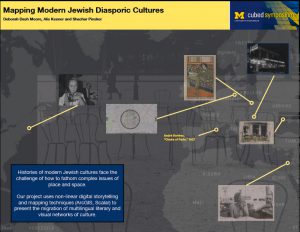 |
| Malibu Beach Surfer, 2011. Photo by R. Goldwitz |
This post is by Elizabeth Cornell, a doctoral candidate in the Department of English at Fordham University. She’s been reporting on her recent summer residency at the NEH-Vectors-CTS Summer Institute at the University of Southern California. She is also the Project Coordinator for the Keywords Collaboratory, a wiki-based space where students and researchers can collaborate on keywords projects inspired by the book, Keywords for American Cultural Studies, edited by Bruce Burgett and Glenn Hendler. This is her last installment.
Oliver Wang has written a book exploring the social history of Filipino American mobile DJ crews in the Bay Area, forthcoming from Duke UP. His visual archive contains video footage of that scene and hundreds of different DJ crew business cards. These days, the web is great place to make a book’s visual archive available to readers. But dumping all that multimedia onto YouTube can defeat the critical purpose of offering it in the first place. And building a web site is time consuming and expensive. One solution, as I mentioned in an earlier post, is the publishing platform Scalar, under development at the University of Southern California, which allows for a clean integration of text and multimedia.
On the first day of the Vectors-CTS Summer Institute on Digital Approaches to American Studies, held at USC, Oliver and other participants presented the material they planned to develop with Scalar.
Another project was Carrie Rentschler’s “38 Witnesses: A Media Archive of the Kitty Genovese Murder.” The 1964 murder is well-known, in part because no witness came to the young woman’s aid. In her Scalar project, Carrie’s textual commentary complements archival resources and recent cinematographic attempts from student to professional film makers to show how the life and death of Genovese has been mediated in her life after death. Scalar allows Oliver and Carrie to interface text with image in dynamic, often nonlinear ways, greatly expanding the depth of their arguments.
After seeing these and other presentations with their rich visual, audio, and textual resources, I was elated. But I felt a little glum about my own project, a largely text-only endeavor. I was attending the Institute to explore how Scalar might at some point be used as a companion to Glenn Hendler and Bruce Burgett’s book, Keywords for American Cultural Studies. Another goal was to investigate how the Keywords Collaboratory—a MediaWiki where students around the country produce largely text-based essays on keywords they’re tracing in their coursework—might be transformed by a platform such as Scalar.
Fortunately, my glumness quickly evaporated. At the Institute I had a design team made up of deeply creative individuals: Tara McPherson, leader of the Institute; John Carlos Rowe, American Studies scholar; and Craig Dietrich, one of Scalar’s two main creators. The keywords project interests them because it does not have extensive multimedia material associated with it. They want to see how Scalar might be used in a largely text-based way and, at the same time, leave the portals open for people who wish to add multimedia. They also are interested in how Scalar might serve as pedagogical tool for collaborative work, an essential component of the keywords project.
Scalar does seem promising: Users can easily add text and upload multimedia; no HTML knowledge required. When it comes to collaborating, it’s possible to see who contributed what and when, and to view the project’s version history. The finished project looks clean and is easy to read, whether there’s only text or image on the page, or text and image. Readers and authors can leave comments for each other. Unique tags link to the book’s pages, sources, and images, revealing relationships among seemingly disparate elements and encouraging nonlinear navigation of the article or book.
Scalar still has some kinks that need working out. But for the humanities students who were born wired, Scalar might be the answer to the MediaWiki’s limitations. For the humanities scholar who feels frustrated by current digital publishing platforms, or simply fears the learning curve involved with new technology, Scalar might be the answer, too.
 Histories of modern Jewish cultures face the challenge of how to fathom complex issues of place and space. Join Shachar Pinsker (University of Michigan) on April 19th, 2:30pm (Lowenstein 906) to learn about his collaborative digital project, Mapping Modern Jewish Diasporic Cultures, that explores modern Jewish cultures and migrations using non-linear digital storytelling and mapping techniques (ArcGIS & Scalar).
Histories of modern Jewish cultures face the challenge of how to fathom complex issues of place and space. Join Shachar Pinsker (University of Michigan) on April 19th, 2:30pm (Lowenstein 906) to learn about his collaborative digital project, Mapping Modern Jewish Diasporic Cultures, that explores modern Jewish cultures and migrations using non-linear digital storytelling and mapping techniques (ArcGIS & Scalar). Using innovative digital tools and databases, this project aims to visualize the tension between the transnational and diasporic, but also grounded in a particular place; belonging to both global and local cultures. The project scholars, who include Pinsker, as well as Deborah Dash Moore and Alix Keener, hope to take macro and micro views of this network of people, analyzing both the diasporic and individual levels, as well as a multimedia view, such as visual and textual analogs.
Using innovative digital tools and databases, this project aims to visualize the tension between the transnational and diasporic, but also grounded in a particular place; belonging to both global and local cultures. The project scholars, who include Pinsker, as well as Deborah Dash Moore and Alix Keener, hope to take macro and micro views of this network of people, analyzing both the diasporic and individual levels, as well as a multimedia view, such as visual and textual analogs.
